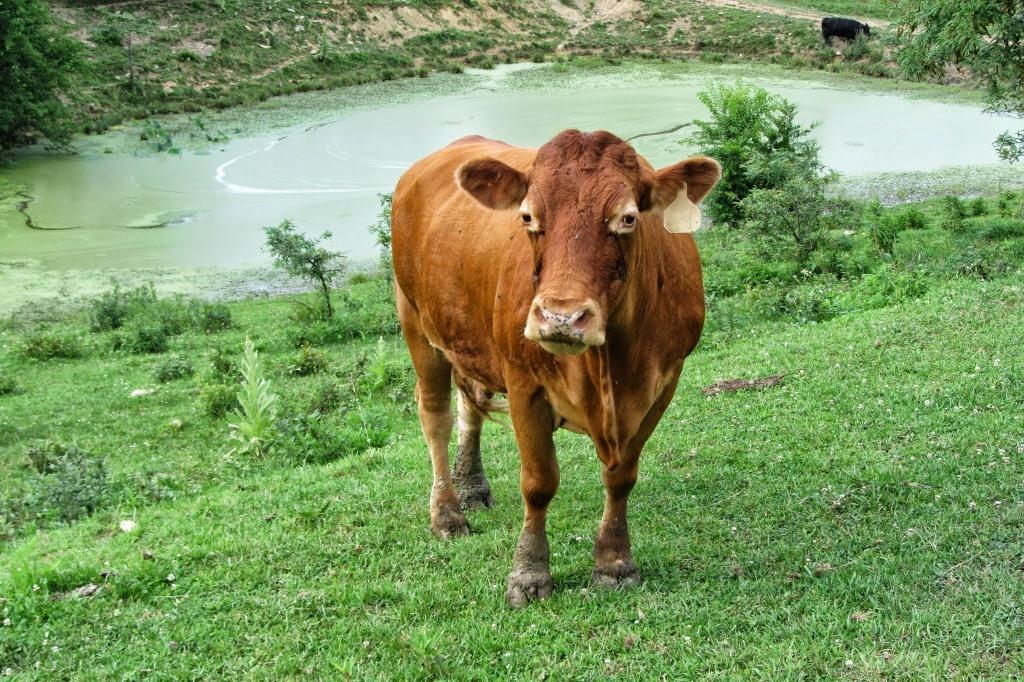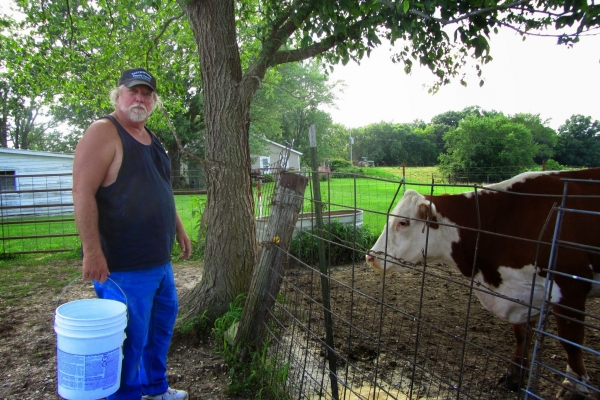Roger Allison raises beef calves with his wife, Rhonda Perry, on rolling pastures in the hills of central Missouri. Their cattle graze on lush grass and cool themselves in a valley pond in the heat of the summer. Industrially-focused farm professionals suggest that beef cows should be sold at age ten because they stop producing calves; on Roger and Rhonda’s pastures, cows still calve at twice that age. “And once a cow’s lived that long and taken care of us,” says Roger, “well, then we’re just running a nursing home.” At age 26, cows #3 and #100 are living out their days on the farm with nothing to do but graze and sleep. “They say it’s bad management, but that’s how we do it. They talk about how you’ve got to treat your livestock just like a piece of machinery… but why be a farmer if you’re going to do that?”
Roger and Rhonda have spent their lives fighting for the survival of family farms like theirs in the face of “expert” advice and a policy framework that has come to favor and incentivize large corporate farm operations. Roger is the Executive Director and founder of the Missouri Rural Crisis Center (MRCC) and Rhonda is Program Director; along with helping to manage the organization, Roger tends to the cattle on the farm. He was a major force in the last powerful progressive farmer-led movement in the 1970s and 1980s, and his many stories range from working with Jesse Jackson to the corporatization of the local electric coop to the proliferation of herbicide-resistant superweeds. The connecting threads are his deep care for people, animals, community and land, and his willingness to fight for them.
Roger first began Missouri Rural Crisis Center as part of the North American Farm Alliance, in 1985, though he was an organizer long before. “We had raised hell in Missouri since the 1970s,” he says. “We put thousands and thousands in the streets and in front of courthouses,” calling for a fair price for farmers—”parity, not charity,” as the protest sign had it: a guaranteed price based on the cost of production rather than hand-outs. Other protests were for civil rights and against South African apartheid. Shortly after its founding, MRCC was instrumental in a protest that occupied the parking lot of the Chillicothe, Missouri, USDA office for 145 days. In the short term, the protest aimed to force out a county supervisor who was unlawfully foreclosing on farms; on a larger scale, it aimed to pressure Missouri lawmakers to pass the farm credit act that would address the rapid rate of farm foreclosures in rural America. In the end, the supervisor was disciplined and transferred, and President Ronald Reagan signed the Agricultural Credit Act into law in 1987—a bill Roger calls “the most progressive piece of legislation since the New Deal.”
Despite Reagan’s signing of the Credit Act, Roger’s political allegiances were elsewhere: he worked with Jesse Jackson on his campaigns in 1984 and 1988, because Jackson was the only presidential candidate to address farm issues, as he built his diverse “Rainbow Coalition.” In an unexpected alliance, rural, mostly-white Missouri counties caucused for Jackson in both his campaigns, along with Black urban counties, university students, and others—because he addressed the farm crisis as a social justice issue. Farmers were a critical voting bloc, but had been ignored for years. “When there’s someone willing to stand up and fight,” Roger says, “there are votes there.”
These days, Roger talks about how crisis can so easily lead to fear and division rather than strength in unity. He says that in a dire moment like the farm crisis, if there is not a strong voice saying, “the way that we solve this issue is all of us together, instead of all of us apart,” the community can fracture. MRCC has been that voice in rural Missouri, building a broad and engaged member base over decades. Many of its more than 5,600 member families came into the organization because of one issue and quickly become involved in many other ways. Even in today’s polarized political climate, Roger says, “We get enough people—farmers, rural people, consumers—together… we’ve changed things in this state—things that are unbelievable.”

One of those unbelievable victories—given the strength of the opposition—was the 1996 passage of the “Hog Bill,” regulating confined animal feeding operations, also known as CAFOs or factory farms. The law was one of the strongest in the nation at the time, in the early days of factory farms, and retained the right of Missouri counties to have say over siting of CAFOs. In the same period, states like Iowa and North Carolina passed bills stripping this local control, prohibiting county governments from establishing local environmental or public health regulations for factory farms. In Missouri, the factory farm lobby has chipped away at elements of the Hog Bill in the nearly 20 years since its passage, but though lobby groups have tried repeatedly to overturn local control, they have been unsuccessful in the face of farmers and rural citizens organizing with MRCC.
In addition to fighting factory farms and corporate control of livestock production, MRCC showcases an alternative to factory farming in Patchwork Family Farms, a cooperative marketing effort of
independent hog farmers. Patchwork pork, raised on independent farms with sustainable growing methods, is available in markets across Missouri—and as part of eight food coops around the state managed by MRCC. The coops provide over one thousand struggling rural families with high-quality, affordable produce, pork and other staples in areas where access to good food is limited. The food coop program has its roots in the 1986 Chillicothe USDA protest, when a grant from the newly-founded farmer support organization Farm Aid allowed MRCC to do emergency food distribution to the farmers occupying the USDA parking lot. The women at the protest—who Rhonda Perry says “were basically running the show”—said that what was really needed was a larger scale food program to help farmers beyond the protest. In response, MRCC started what was then the only statewide rural emergency food program and ran it until 1992, when they transformed it into a cooperative effort run by farm families and rural citizens.
Pointing to MRCC’s many irons in the fire—near-constant legislative fights against corporate agriculture bills, local, regional and national organizing on issues from Medicaid expansion to livestock to trade deals, and much more—Roger says, “We’ve never slowed down—because that wasn’t on our agenda. It’s easy to say: ‘we didn’t plan on that,'” But for Roger and MRCC, the agenda has instead always been, “We have got to fight tooth and nail for what’s good and right for farm families and our communities. And our members and supporters have always showed up and stood up—they always respond to an injustice or to something that isn’t right.”
Text and photos by Siena Chrisman.



